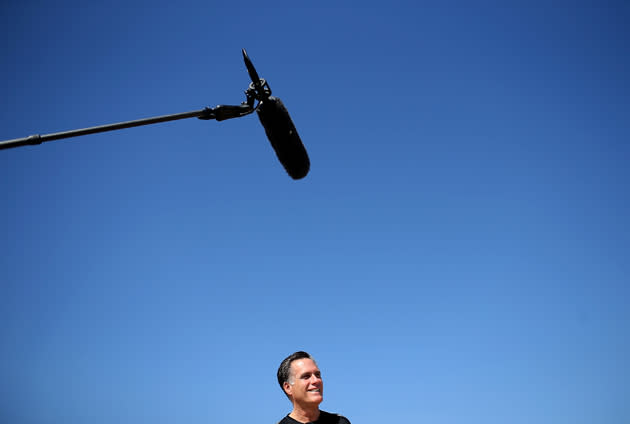 The Ticket
The TicketRomney: Attack or hold back?

DELRAY BEACH, Fla.—When Mitt Romney meets President Barack Obama in Monday's third and final presidential debate, the GOP candidate will face a crucial dilemma: How aggressive can he be against his Democratic opponent without alienating swing voters?
In recent weeks, Romney has straddled the line between a more centrist message on the campaign trail on issues including immigration and abortion, and aggressively challenging Obama. The latter tone has fired up the Republican base voters Romney desperately needs to turn out on Election Day, but his advisers acknowledge it hasn't played well with the narrowing list of undecided voters likely to determine the outcome of the campaign.
A senior Romney aide, who declined to be named, tells Yahoo News that internal focus groups didn't like the aggressive exchanges between Romney and Obama during the last debate. The aide was careful to note that both candidates were viewed negatively during those moments—including one in which Romney and Obama seemed close to getting into each other's face. But their reaction was considered riskier for Romney, who has struggled to improve his likability numbers against Obama's after months of negative ads from Democrats.
Ahead of the first debate, Ohio Sen. Rob Portman, who has been acting as a stand-in for Obama during Romney's debate prep, was instructed to poke at Romney to teach the candidate to control his temper and avoid showing irritation with his opponent. In recent days, according to one Republican privy to Romney's debate prep, the candidate has been working on that style issue again.
Romney and Obama "were pretty much even on likability after the first debate," a Romney adviser said. "You don't want to have the last debate resulting in a bad final impression."
Likability is a complex issue extending well beyond the debate stage. Romney's path to victory is to sell himself both as a more moderate candidate who can rise above Washington's partisan rancor and one who can whip up a conservative base that wants him to aggressively challenge Obama.
Romney aides insist those goals aren't at odds. They say he'll continue to both emphasize his record as governor of Massachusetts, where, as he repeatedly reminds voters, he served in a heavily Democratic state, and sell voters on a softer image, sticking with a stump speech that talks about voters he's met on the trail and people he has helped in his personal life.
[Political junkie? Sign up for the Yahoo! News Daily Ticket newsletter today]
He's expected to balance that message by telling voters Obama has presented no job-creation agenda for a second term and has abandoned both his theme of "hope and change" and an ideas-based campaign in favor of relentlessly negative campaigning.
Speaking to more than 8,000 people in Daytona Beach, Fla., on Friday, Romney kicked off a rally by responding to Obama's quip last week that the GOP candidate had contracted "Romnesia" in trying to soften policy positions he had advocated during the GOP primary.
Without mentioning Obama's specific barb, Romney slammed his opponent for "petty attacks" and playing "silly word games," and told supporters the president is waging the "incredible shrinking campaign."
"This is a big country with big opportunities and big challenges, and they keep talking about smaller and smaller things," Romney said, a line that prompted the friendly crowd to roar with approval.
Building out his image with voters and challenging Obama and his policies are not mutually exclusive, said Stuart Stevens, Romney's senior strategist.
"You can't separate these things. ... I don't see these as 'column A' or 'column B,' and I don't think people see it that way either," Stevens told Yahoo News. "You want to see a mix of the personal, a mix of the professional, a mix of what you're going to do. And that's what we will focus on."
